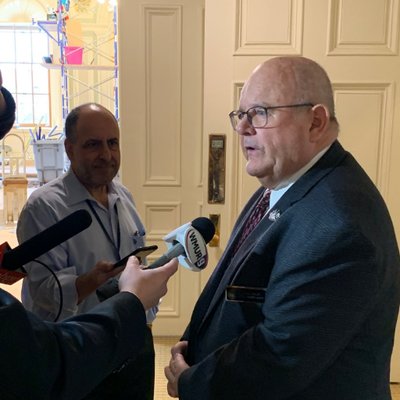By GARRY RAYNO, InDepthNH.org
CONCORD — House Republicans voted Tuesday to block action on bills next month when the House meets for the first time since Mid-March unless the Democratic leadership gives them more input.
House rules have to change because the deadline for House action on its bills has passed, and without a rule change, bills would need a two-thirds majority to be approved.
House Speaker Stephen Shurtleff decried what he called the Republicans’ unprecedented action.
“We will still show up on June 11th in an effort to do the people’s work despite their unprecedented action,” Shurtleff said in a statement. “If House Republican leadership chooses to sit back and prevent the legislative process from moving forward they can do it in public for everyone to see.”
House Minority Leader Dick Hinch, R-Merrimack, said his party has been boxed out of discussions on the upcoming session including setting policy priorities for committees.
“Back in March, the Speaker set up a bipartisan committee to work on planning for the continuity of House business and legislative operations during this crisis. That committee held one conference call months ago and has not met since. We are just being informed at what the Democrats have already decided to do. That’s not bipartisan cooperation,” Hinch said. “Republicans are being denied a seat at the table.”
But Shurtleff responded he has kept the minority leadership informed.
“As Speaker, not a week has gone by where I have not been in touch with a member of the Minority Leadership team and for them to suggest otherwise is preposterous and an outright lie,” Shurtleff said. “To me it is outrageous when our state is facing a pandemic for us to abandon our important work.”
Hinch also said the speaker asked his committee chairs to reach out to the ranking minority members for input on priority bills. He said that has not happened: in some cases there has been no communications and in others chairs told the ranking members what the priorities are with no chance for discussion.
“We could have spent the last two months working on a bipartisan plan to get the people’s business done, and work on solutions to ensure House business is able to move forward safely,” Hinch charged. “Instead we have mostly a one-party decision-making process.”
He said Republicans have no idea what the Democrats plan to do about the budget shortfall, the state’s small businesses, or if they plan to ram an income tax through.
“Democrats have politicized this crisis on a regular basis, and without transparency,” Hinch said, “we can only assume they are not acting in good faith.”
Shurtleff said the Republicans’ action seeks to prevent lawmakers from doing their jobs and addressing the problems facing the state including the coronavirus pandemic.
“We were elected by the people of New Hampshire to do the people’s business but today House Republicans voted to instead limit the work of the New Hampshire House of Representatives,” Shurtleff said. “Their actions today could prevent the legislature from enacting department requests to ensure continuity of government in these unprecedented times.”
He said it could also prevent action on bills to address the COVID pandemic, to name a highway after a police officer killed in the line of duty and to finish the work they were elected to complete.
Bad blood between the Democrats and Republicans has been growing this session after Democrats took control of the House in 2018 for the first time since the 2012-14 session.
The rancor increased after seven Republicans were reprimanded for failing to attend or provide documentation they attended sexual harassment prevention training as required by House rules.
The last session day this year, March 12 went until the morning of March 13 as a small group of Republican House members slowed progress to protest the reprimands.
When Shurtleff and Senate President Donna Soucy announced the Senate and House would return for sessions the second week of June, Hinch criticized Shurtleff for spending $200,000 on a voting system for the House which will meet at Whittemore Center on the University of New Hampshire’s Durham campus.
Lawmakers had not reached crossover, when the House has to send its approved bills to the Senate, and the Senate sends its bills to the House when the session was suspended due to the coronavirus.
Without a rule change for the deadline, any House bill would require a two-thirds majority for passage. The House would be able to vote to concur with Senate changes to House bills, which would send them to the governor, because a simple majority would be needed for approval.
Garry Rayno may be reached at garry.rayno@yahoo.com.





